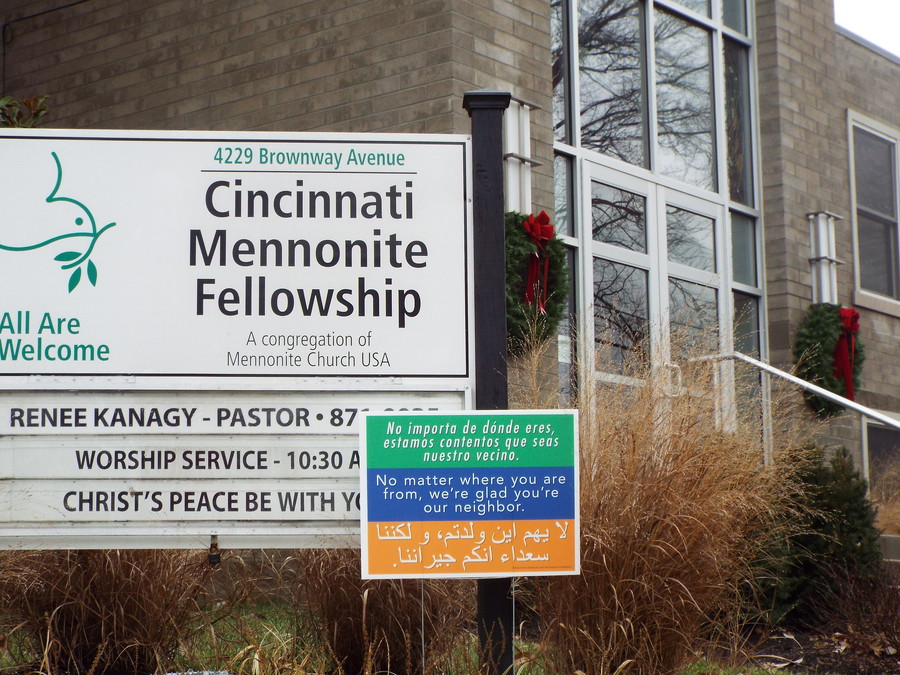CINCINNATI -- There’s a sign in front of the Cincinnati Mennonite Fellowship in Oakley that says in English, Spanish and Arabic, “No matter where you are from, we’re glad you’re our neighbor.”
The church put it up in October, when, in the words of pastor Renee Kanagy, the nation was hearing a “lot of hate speech about immigrants.”
The church “wanted to do something small, but concrete, to say, ‘We’re glad you’re here.’”
The sign is a copy of one originally put up by Immanuel Mennonite Church in Harrisonburg, Virginia, Bradley Kauffman said.
Kauffman is Kanagy’s husband and works for Mennonite publishing house MenoMedia, headquartered in Harrisonburg.
On a visit to Harrisonburg in September, he obtained one of the signs to put in front of his and Kanagy’s house in Pleasant Ridge. Since then, he’s been printing them for church members and neighbors, charging just the $9 it costs to print them.

A sign in the yard of the Cincinnati Mennonite Fellowship in Oakley reads, “No matter where you are from, we’re glad you’re our neighbor,” in English, Spanish and Arabic. (Photo by Kevin Eigelbach)
He said more than 100 have been placed around town so far, and in late January, he placed an order for more.
After President Donald Trump's executive order temporarily banning immigration from seven predominately Muslim countries Jan. 27, Kauffman said requests really took off.
“I’ve received several dozen inquiries about them,” he said. “The realities of what the Trump administration carried out in the first week in office have been devastating. People have been responding in symbolic ways. … This is one way.”
And the sentiment is very much in keeping with Mennonites’ traditional teaching on peacemaking and welcoming the stranger.
“Reconciliation, or peacemaking, is at the center of our work,” Kanagy said, whether it’s making peace with neighbors or with one’s self.
Kanagy said about 80 people attend worship on any given Sunday at the fellowship, which began as a church in a Clifton home 40 years ago. About 30 of them are under 18.
It’s not a neighborhood church -- none of the members live in Oakley. Members come from as far north as southern Montgomery County and as far south as Northern Kentucky, Kanagy said.
As a community, the Cincinnati Mennonite Fellowship has tried to stay in touch with its denomination’s history of persecution, she said. Mennonites came to the United States from Europe because here, they could avoid mandatory participation in military service. Many chose conscientious objector status during wartime.
The Mennonite church originated in the Anabaptist or “rebaptizers” movement in 16th century Europe. Anabaptists were so-called because they believed only adults, who could express their faith in Jesus, could be baptized, and so re-baptized many who were baptized as infants. At the time, this was considered a heresy, and many Anabaptists were persecuted and killed for their beliefs.
The Mennonites were named for Menno Simons, a Roman Catholic priest who aligned himself with Anabaptists in 1536. A related faith tradition is the Amish, Anabaptists who shun most modern conveniences and dress plainly.
Cincinnati fellowship member Hal Hess grew up in a very conservative Mennonite community in Lancaster County, Pennsylvania, along with a large community of Amish. Mennonite women wore head coverings and long dresses, he said, and men always wore long-sleeved shirts.
He vividly remembers passing Amish when he made trips to Lancaster and thinking, “I’m sure glad I don’t look like them.”
Like many Mennonites, he and his wife, Catherine Schumacher, spent several of their young adult years doing charitable work. In their case, it was five years in Atlanta during the late ‘60s, working and living with inner-city children.
That experience was so rewarding to them, Hess said, that they resolved to live permanently in a predominantly African-American community, where they would be in the minority. So they settled in Kennedy Heights, which is about 70 percent African-American, he said.
In the late ‘80s, they joined the Cincinnati Mennonite Fellowship. In 1992, they helped the congregation host its first Mennonite Arts Weekend, a biennial event in which the church invites about a dozen Mennonite artists from around the country to display their work.
It’s the only such arts gathering sponsored by a local Mennonite church in the United States or Canada, Hess said. He still chairs the event.
It would have been unthinkable to hold such an event at the Mennonite congregation Hess grew up in. Although members made beautiful quilts and furniture, he said, it was all to be used and not displayed -- the sanctuary had only bare walls to look at.
One Mennonite tradition the Cincinnati fellowship has continued is that of singing hymns unaccompanied by a piano or organ, in four-part harmony. The sanctuary has a reverberating sound that encourages singing, Hess said.
The fellowship uses a hymnal that got a lot of attention from the hymnal community when it was published in 1992, Kanagy said, because it uses a lot of music from nonwhite cultures.
One way the fellowship extends love to neighbors around the world is through its sponsorship of fair-trade products. In 2002, the fellowship spearheaded the effort to open a Ten Thousand Villages store in O’Bryonville and a second store in Symmes Township in 2013, Kanagy said. Its mission is to provide a fair income to people in developing nations by marketing their goods in the United States and Canada.
As the sign says, no matter where you’re from, they’re glad you’re their neighbor.


